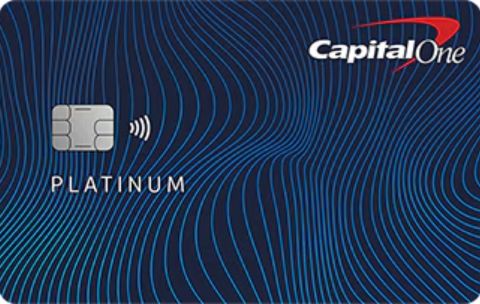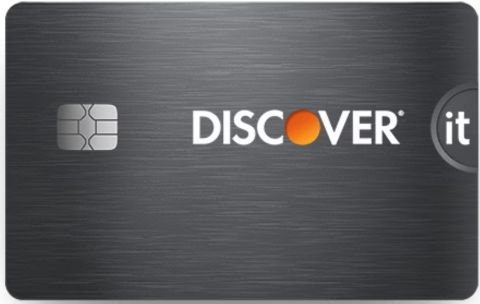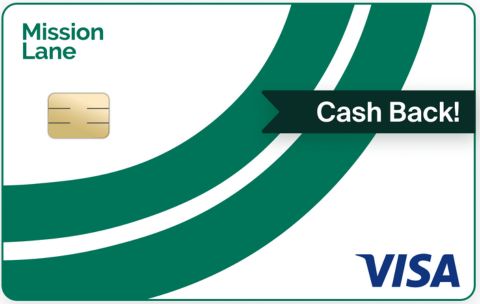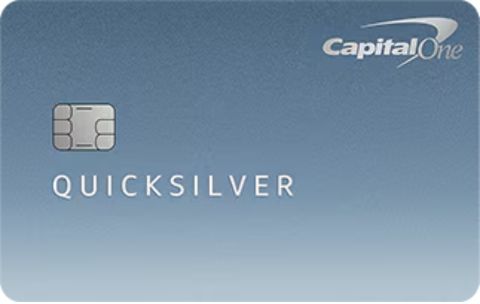Anúncios
If you’re dealing with bad credit, you’re not alone. Millions of Americans face this challenge.
It’s often due to unexpected life events, job loss, or not knowing how to manage credit. But, there’s good news. There are credit cards made to help you improve your credit and financial health.
In this article, we’ll show you how to use credit cards to rebuild your credit. This way, you can take charge of your financial future.
Best Credit Cards for Bad Credit

1. Capital One Platinum Credit Card
- No annual fee, making it affordable for credit building.
- Reports to all three major credit bureaus to help improve credit score.
- Automatic credit line review for potential increase in as little as 6 months.
Disclaimer: You will be redirected to the bank’s website.
Disclaimer: You will remain on the website.

2. Discover it® Secured Credit Card
- No annual fee, ideal for rebuilding credit affordably.
- Earn 2% cashback at gas stations and restaurants, 1% on all other purchases.
- Transition to an unsecured card after consistent on-time payments.
Disclaimer: You will be redirected to the bank’s website.
Disclaimer: You will remain on the website.

3. Mission Lane Visa® Credit Card
- Easy approval process, even for bad credit.
- Transparent terms with no hidden fees.
- Helps build credit with responsible use and monthly reporting.
Disclaimer: You will be redirected to the bank’s website.
Disclaimer: You will remain on the website.

4. Quicksilver Secured Cash Rewards Credit Card
- Unlimited 1.5% cashback on every purchase.
- No annual fee, perfect for rebuilding credit with rewards.
- Secured card designed to graduate to unsecured with responsible usage.
Disclaimer: You will be redirected to the bank’s website.
Disclaimer: You will remain on the website.
Key Takeaways
- Credit cards for bad credit can help you rebuild your credit score over time
- Understanding the factors that contribute to your credit score is crucial for effective credit repair
- Secured and unsecured credit cards are two main options for individuals with poor credit
- Choosing the right credit card and using it responsibly are essential for improving your credit
- Developing healthy financial habits, such as making timely payments and keeping balances low, can help you achieve your credit goals
Understanding Bad Credit
Having a low credit score can make it hard to get loans, credit cards, or even rent an apartment. But what is “bad credit,” and how is it calculated? Let’s explore this important financial topic.
What is Bad Credit?
A credit score between 300 and 629 is considered “bad credit.” It shows a history of missed payments and high credit use. This makes lenders see you as a higher risk, making it tough to get good interest rates or credit approval.
How is Credit Score Calculated?
Credit scores, like the FICO score, are based on several factors. These include payment history, credit use, and how long you’ve had credit. Payment history and credit use are the biggest parts of your score.
Common Causes of Bad Credit
There are many reasons for a low credit score. These include:
- Late or missed payments on bills, loans, or credit cards
- High credit card balances or maxed-out credit limits
- Bankruptcy, foreclosure, or other major financial setbacks
- Insufficient credit history or a limited mix of credit accounts
- Identity theft or errors on your credit report
Fixing these issues and building a good credit history is key. It helps you get better low credit score cards and more financial opportunities.
Knowing what affects credit score calculation is the first step to a better financial future. By understanding bad credit causes, you can fix your report. This leads to a healthier financial life.
The Importance of Credit Repair
Rebuilding your credit can change your financial life. It helps if you have a low score from past mistakes or want a better credit profile. The benefits of fixing your credit are clear.
Why Rebuilding Credit Matters
Your credit score matters a lot. Lenders, landlords, and employers look at it. A bad score can make it hard to get good loans, rent, or even get your dream job.
By fixing your credit, you open doors to better opportunities. This puts you on the path to financial stability.
Benefits of Improving Your Credit Score
Improving your credit score brings many benefits. Here are some key ones:
- Lower interest rates on loans and credit cards save you money.
- You’re more likely to get approved for loans and credit cards.
- You can negotiate better terms, like lower deposits.
- It helps you get rental housing and jobs, as employers check your score.
- Lower insurance premiums, as insurers use credit scores to set rates.
Investing in credit repair boosts your financial profile. It also empowers you to grab new chances and reach your goals.
| Benefit | Impact |
|---|---|
| Lower Interest Rates | Saves thousands over the life of a loan |
| Increased Approval Chances | Access to more credit and financial products |
| Improved Bargaining Power | Negotiate better terms on deposits and fees |
| Better Housing and Employment Opportunities | Overcome credit-based screening processes |
| Reduced Insurance Premiums | Pay less for auto, home, and other insurance |
Types of Credit Cards for Bad Credit
If you have bad credit, don’t worry. There are credit cards that can help you improve your score. You can choose from secured, unsecured, and store credit cards. Each has its own benefits and drawbacks.
Secured Credit Cards
Secured credit cards need a refundable deposit, usually $200 to $2,000. This deposit is your credit limit. They’re perfect for those with bad credit or no credit at all. They help you build credit by reporting your payments to credit bureaus.
Unsecured Credit Cards
Unsecured credit cards for bad credit don’t need a deposit. They’re for people with poor or limited credit. They often have high interest rates and low limits. But, they’re easier to get. Just be careful not to spend too much.
Store Credit Cards
Store credit cards are issued by retailers. They have lower limits and higher rates. But, they’re easier to get than regular credit cards. Using them wisely can help improve your credit score over time.
It’s important to use your chosen card wisely. Make payments on time and check your credit report. With patience and careful credit use, you can improve your financial health and reach your goals.
| Card Type | Deposit Requirement | Credit Limit | Interest Rates | Fees |
|---|---|---|---|---|
| Secured Credit Card | $200 – $2,000 | Equal to Deposit | 12% – 25% | Annual Fee: $0 – $50 |
| Unsecured Credit Card | None | $300 – $1,000 | 20% – 30% | Annual Fee: $0 – $100 Application Fee: $0 – $95 |
| Store Credit Card | None | $300 – $1,000 | 20% – 25% | Annual Fee: $0 – $50 |
The table above shows the main features of different credit cards for bad credit. It’s key to look at each option’s terms to find the best fit for you.
How to Choose the Right Card
Choosing the right credit card is crucial for building your credit. As you explore credit cards for bad credit, consider several important factors. This ensures you pick the best card for your financial needs.
Interest Rates to Consider
When picking a credit card for bad credit, the annual percentage rate (APR) is key. Look for cards with competitive interest rates. This can greatly affect the cost of carrying a balance. The Capital One Platinum Credit Card and the Discover it® Secured Credit Card often have lower APRs for those with poor credit.
Understanding Fees and Charges
Before signing up, carefully review the fees and charges of a credit card. Annual fees, application fees, and other charges can quickly add up. Look for cards with minimal or no fees, like the Discover it® Secured Credit Card, which has no annual fee.
Credit Limit and Usage
The credit limit on your card is also vital. A higher credit limit can help you keep a lower credit utilization ratio. This is important for your credit score. The Capital One Platinum Credit Card often offers higher credit limits compared to other bad credit cards.
By evaluating these key elements, you can find the right credit card for your financial situation. The right card can be a powerful tool in rebuilding your credit. Remember, the right card can be a powerful tool in rebuilding your credit.
Applying for a Credit Card with Bad Credit
Applying for a credit card with bad credit can seem tough. But, with the right steps, you can boost your approval chances. By preparing well before and during the application, you can start fixing your credit.
Steps to Take Before Applying
Before starting the credit card application process, check your credit report. Look for errors and fix them. This helps you understand your current credit situation and what needs work.
Also, collect any documents you might need, like proof of income. Lenders might ask for these during the application.
What to Expect During the Application Process
When you apply for a starter card with bad credit, expect a closer look at your finances. Lenders will check your income, job stability, and how much credit you use. Your credit score is important, but they’ll also look at other factors.
Be patient and truthful during the application. This honesty can help you get a card that meets your financial needs.
Remember, the credit card application process is key to improving your credit. By knowing the steps and being proactive, you can confidently work towards better credit.
Tips for Managing Your Credit Card
Managing your credit card well is key to a better credit score and financial health. By adopting a few simple habits, you can control your credit card use and build a solid credit history. Here are some essential tips for effective credit card management.
Making Timely Payments
On-time payments are the cornerstone of credit card management. Paying your bills by the due date is crucial for a good credit score. Set up automatic payments or reminders to avoid missing payments.
Keeping Your Balance Low
Keeping your credit usage low is also vital. Your credit utilization ratio shows how much of your available credit you use. Try to keep this ratio under 30% to show you’re using your credit wisely and boost your score.
Regularly Checking Your Credit Report
It’s important to regularly check your credit report for errors. Look at your report at least once a year. If you find mistakes, report them to the credit bureaus to keep your credit history accurate.
| Credit Card Management Tips | Benefits |
|---|---|
| Make timely payments | Maintains a good credit score |
| Keep your balance low | Improves credit utilization ratio |
| Check your credit report regularly | Identifies and corrects errors |
By sticking to these credit card management tips, you’ll build a strong credit profile and enhance your score. Consistent, responsible use of your credit card is the path to financial success.
Building Credit History
When it comes to credit history building, the type of credit you have is key. This is called your credit mix. Lenders look at how well you manage different credit accounts, like credit cards and loans. Showing you can handle various credit mix types can boost your credit score.
The Role of Credit Mix
A mix of credit accounts shows lenders you can manage different types responsibly. This includes both revolving credit (like credit cards) and installment loans (like auto loans). A diverse credit mix shows you’re financially mature and can handle different credit obligations.
Duration of Credit Accounts
The length of your credit history is also crucial. Lenders like to see long-standing credit accounts. This shows you can manage credit over time. Keeping your credit accounts open and in good standing helps build a strong credit history.
“Building a solid credit history takes time and consistent responsible behavior, but the benefits of a good credit score are well worth the effort.”
Remember, credit history building is a journey. By understanding credit mix and account duration, you can work on a strong credit profile over time.
Using Your Credit Card Wisely
Using your credit card responsibly is key to rebuilding your credit. By using a few smart strategies, you can make the most of your credit cards. This way, you can avoid debt that slows down your financial growth.
Setting a Budget
Start by making a budget that’s realistic. Figure out how much you make each month and what you spend. Then, set aside money for your credit card payments. This keeps you on track and stops you from spending too much.
Avoiding Impulse Purchases
It’s tempting to buy things on impulse, but it can hurt your credit score. Before buying, think if it fits your financial goals and if you can afford it. This helps you avoid overspending and keeps your credit score healthy.
Knowing Your Credit Utilization Ratio
Your credit utilization ratio shows how much credit you use compared to what’s available. Keeping this ratio under 30% is important for a good credit score. By watching your ratio and paying on time, you show you’re using your credit wisely. This can help improve your credit score.
Remember, the key to using your credit card wisely is to stay within your means, avoid impulse purchases, and maintain a low credit utilization ratio. By following these principles, you’ll be well on your way to rebuilding your credit and achieving your financial goals.
Common Mistakes to Avoid
Rebuilding your credit with credit cards requires avoiding common pitfalls. Let’s look at two key mistakes to avoid to stay on track.
Ignoring Credit Statements
Ignoring your credit card statements is a big mistake. Credit card mistakes often start with overlooking important information. Regularly checking your statements helps catch errors and unauthorized charges.
It also ensures you’re making payments on time. Neglecting this can lead to late payments, harming your credit score.
Maxing Out Your Credit Limit
Another mistake is maxing out your credit limit. Credit limit management is key for rebuilding credit. Keeping your credit utilization ratio low shows lenders you can manage your credit well.
Maxing out your limit signals you might struggle with payments, hurting your score. By avoiding these mistakes and managing your credit wisely, you can rebuild your credit and reach your financial goals.
RECOMMENDED CONTENT

20 Real Ways to Make Money from Home in 2025
“The key to rebuilding credit is to avoid the pitfalls that can set you back. Stay vigilant, review your statements, and manage your credit limit wisely.”
Resources for Credit Improvement
Rebuilding your credit can be tough, but you’re not alone. Many resources are here to help you improve your score. From credit counseling services to credit monitoring tools, you’ll find the support you need.
Credit Counseling Services
Credit counseling services are a big help. They have experts who can guide you. They help you understand your credit report, fix errors, and improve your score. Many offer free or low-cost help, making it easy for everyone to access.
Tools for Monitoring Your Credit Score
Keeping an eye on your credit score is key. Luckily, many credit monitoring tools are available. These tools give you updates, alerts, and insights to help you improve your credit.
“Regularly monitoring your credit score and report is essential for identifying and addressing any issues that may be holding you back from achieving your financial goals.”
Improving your credit takes time, but it’s possible. With the right resources and financial habits, you can turn things around. Check out the credit improvement resources and start your journey to a better financial future.
| Credit Counseling Service | Key Features | Cost |
|---|---|---|
| National Foundation for Credit Counseling (NFCC) | Free initial consultation Debt management plan assistance Credit report review and monitoring | Varies, often low-cost or free |
| Consumer Credit Counseling Service (CCCS) | Personalized financial coaching Debt consolidation and repayment plans Bankruptcy counseling and education | Affordable, with sliding scale fees |
| Money Management International (MMI) | Free credit report review Budgeting and money management assistance Financial education workshops | No upfront fees, service fees based on client’s ability to pay |
Your Path to Better Credit
Your journey to better credit shows your determination and commitment to financial health. By starting this journey, you’ve opened the door to a brighter financial future. Remember, improving your credit takes time and effort, but it’s worth it in the end.
Taking the First Steps
Getting a credit card for bad credit was a smart move. It lets you show you can handle credit well. By paying on time and keeping balances low, you’re on the right track to a better credit score.
Staying Committed to Your Financial Goals
Keep up the good work and stay disciplined. Check your credit report often, fix any mistakes, and work on using less of your credit. Your financial goals are closer than you think, and every step you take makes your future stronger.